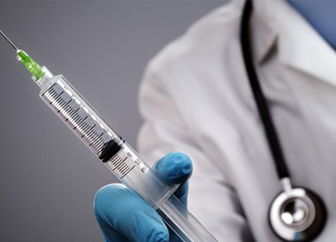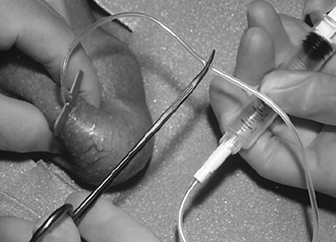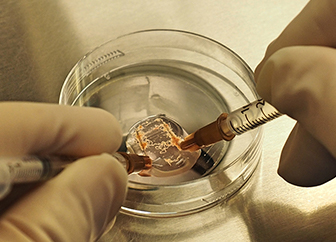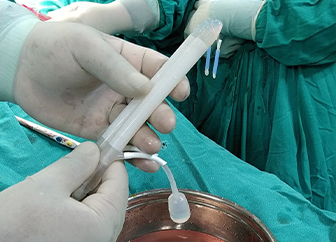What are some of the most common causes of male infertility?
Physical factors may include varicocele, undescended testicles, injury or previous surgery to the testicles, exposure to radiotherapy, environmental toxins or drugs, and alcohol. Genetic factors include Klinefelter’s syndrome, cystic fibrosis and undefined genetic polymorphisms, infections and sexually transmitted diseases may also cause fertility problems. Many infertile men have idiopathic infertility, meaning a specific cause of infertility cannot be diagnosed. A fertility specialist and urologist can investigate possible causes for fertility difficulties.
Are there medical or surgical treatments for male infertility?
In some cases, such as varicocele, surgical repair may be an option. Certain drugs can be used to improve sperm quality. If there are underlying hormone deficiencies then this option should be discussed with your doctor. Some of these drugs include clomiphene citrate, tamoxifen, and antibiotics.
What is measured in a semen analysis?
There are several semen quality parameters tested in a semen analysis, including sperm motility, concentration, morphology, and vitality. Additionally, other semen characteristics are measured that may help diagnose specific pathologies. It is important to note that most parameters measured do not provide a definitive diagnosis of infertility, rather they help the physician assess the possibility of specific infertility problems and specific therapeutic options.
What is erectile dysfunction?
Erectile dysfunction commonly referred to as ED is the inability to achieve and sustain an erection suitable for sexual intercourse.
Can erectile dysfunction be prevented?
Maintaining a desirable weight, eating a healthy diet, quitting smoking, drinking less or no alcohol, keeping your cholesterol/blood pressure in check, and getting more physical activity will reduce risk factors that lead to the development of ED.
How often is ED a sign of something more serious?
Unfortunately, ED is most often a sign of something serious. Obtaining an erection involves healthy blood flow, erectile dysfunction often means that cardiovascular disease, high blood pressure, or high cholesterol could be the reason.
ED can also stem from an unhealthy lifestyle, including smoking, alcohol and drug use, and obesity, which can all lead to more serious health issues down the road. While a younger man with ED is usually suffering from some kind of mental block, he should get checked for physical causes as well. ED at a younger age could actually indicate a serious underlying cause of heart disease.
How is erectile dysfunction treated?
There are many different ways ED can be treated, including oral medications, sex therapy, penile injections, and surgery. Each type of treatment has its own advantages and disadvantages. Talk to your doctor to determine the best treatment for you.
What’s the difference between ED and ejaculatory dysfunction?
Although they often occur in conjunction with each other, they are separate issues. Ejaculatory dysfunction includes premature ejaculation, delayed ejaculation, or painful ejaculation, whereas erectile dysfunction is the inability to even achieve or maintain an erection.
Can a man go through menopause?
Yes, a man can go through menopause, but to a different extent than a woman. Menopause is a term used to describe the end of a woman's fertility. It literally means the end of menstruation. Female menopause is characterized by changes in hormone production. The male testes, unlike the woman's ovaries, do not lose the ability to make hormones. A healthy male may be able to make sperm well into their 80s or longer.
On the other hand, subtle changes in the function of the testes may occur as early as 45-50 years of age, and more dramatically after the age of 70. Because men do not go through a distinct male menopause period, some doctors refer to this as androgen (testosterone) deficiency in the ageing male (ADAM). Men typically experience a decline in testosterone production due to ageing, but it can also be related to some diseases like diabetes.
The waning function of the testicles contributes to symptoms like fatigue, weakness, depression or decreased sexual desire. If testosterone levels are low, replacing that hormone may help relieve them. However, replacing male hormones can worsen prostate cancer and high cholesterol levels. Consult your doctor to see if hormone treatment is right for you.
How do I know if I’ve got performance anxiety issues?
Performance anxiety issues affect everyone differently. It can cause symptoms, such as premature ejaculation, inability to orgasm, or loss of interest in sex.
Some men mistakenly think they have erectile dysfunction when they have performance anxiety. If you struggle to get and maintain an erection, but it only happens every now and again, it could be performance anxiety. Consult your doctor if you’re concerned.
What is considered premature ejaculation?
There is not a standard amount of time that an erection should last before ejaculating. The AUA defines premature ejaculation as “ejaculation that occurs sooner than desired, either before or shortly after penetration, causing distress to either one or both partners.”
We make this diagnosis based on your report and a physician assessment. Treatment options are available. Your provider can help you decide which is best for you.
Is my penis average in size compared to other men?
This is a question that is hard to answer, and one that many men wonder about. There are many different techniques to measure penis length, including the amount of force the clinician uses to stretch the penis.
Some men will see a significant change in penis length once it is erect. Others will notice that their penis only becomes more rigid. There is not a number that men should set as their benchmark. Some medical conditions and surgical procedures can reduce the length of your penis. We cannot always restore the length you lose.
The biggest take-home for patients regarding this is to keep a healthy weight. Consult a doctor if you feel like your erections are not rigid enough or if you have other concerns about your penis.
How long should my erection last during sex?
The answer to this question is completely different per person. There is not a standard time that all men should be able to maintain an erection.
For most men, the goal is to get an erection that is rigid enough for penetrative sex and that lasts until both partners are satisfied. We counsel patients that if an erection has lasted over three to four hours, they should get care with the nearest emergency room.






